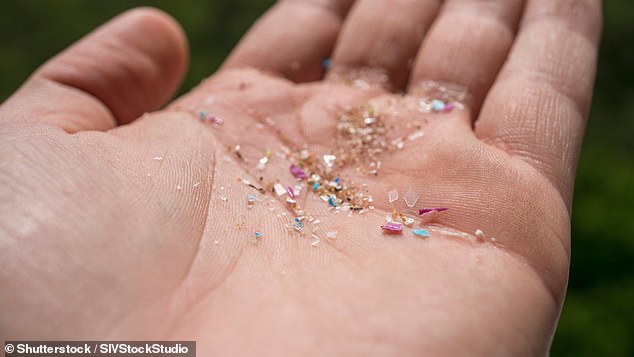Microplastics used in food packaging could make their way into the penis and cause sexual problems, experts have warned.
The discovery was made by researchers who examined the penile tissue of men undergoing erectile dysfunction surgery, and found the tiny particles in eight in ten samples.
They labelled the discovery ‘concerning’ and claimed that microplastics could affect the muscle function of the penis.
Microplastics are plastic fragments as small as two micrometres, or two-thousandths of a millimeter.
These particles make their way into food, water supplies and even into the air when plastic products degrade naturally.


The particles, as small as just two micrometres or two thousandths of a millimetre, have long been detected in air, water and food around us. But US scientists, who assessed the tissue of men who had undergone erectile dysfunction surgery, found seven different types in 80 per cent of samples taken
Recent studies have identified microplastics in human lung tissue, in maternal and fetal placental tissues, in human breast milk and in human blood.
A growing body of research has already linked them to the development of cancer, heart disease and dementia and even lower-quality sperm.
Dr Ranjith Ramasamy, co-author of the latest study and former director of reproductive urology at the University of Miami, said: ‘The penis is a vascular, spongy organ so is definitely vulnerable.
‘During an erection, a fifth of the blood volume in the whole body gets pumped to the penis.
He added: ‘We know erectile dysfunction is multifactorial. You need good hormones, nerves, blood supply, and good smooth muscle tissue for an erection to happen.
‘We found that microplastics were present in the smooth muscle of the penis.
‘All we know is that they are not supposed to be there, and we suspect that it could lead to smooth muscle dysfunction.’
He added: ‘As a society, we need to be cognisant that drinking water from plastic water bottles, getting takeout food in plastic containers and, even worse, microwaving food in plastic containers, are contributing to having things in our body that should not be there.
‘And the penis is the one organ that everybody will pay attention to.’
The researchers, who analysed the tissue of five men, found almost half (47.8 per cent) of the microplastics were polyethylene terephthalate, commonly used to make clothes and food and drink packaging.
Polypropylene — a harder microplastic also used in packaging — formed more than a third (34.7 per cent) of the substances.
Some were as large as half a millimetre.


Erectile dysfunction affects 4.3million men in the UK, including half of all men aged 40 to 70. One in 10 will experience erectile dysfunction at some point in their lifetime. Drugs like Viagra (pictured) are used to manage erectile dysfunction in at least two thirds of cases, according to the NHS
Writing in the journal, IJIR: Your Sexual Medicine Journal, the scientists said: ‘Our study presents a ground-breaking investigation into the presence of microplastics in penile tissue.
‘The detection of microplastics in penile tissue raises inquiries on the ramifications of environmental pollutants on sexual health.’
Erectile dysfunction affects 4.3million men in the UK, including half of all men aged 40 to 70.
One in 10 will experience erectile dysfunction at some point in their lifetime.
Drugs like Viagra are used to manage erectile dysfunction in at least two thirds of cases, according to the NHS.
Erectile dysfunction often acts as a marker of a man’s overall health.
An inability to get or maintain erection could be a result of undiagnosed high cholesterol or blood pressure or even a warning sign of cardiovascular disease, according to experts.
This is because blood vessels need to dilate for blood to flow to the penis and allow a man to get erect.
But cardiovascular disease can narrow the arteries meaning less blood can flow through — making it difficult to get or maintain an erection.
Source: Mail Online






